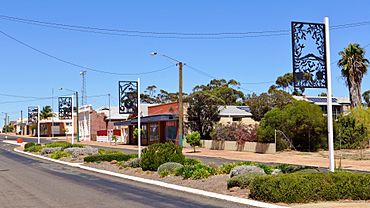Gnowangerup, Western Australia facts for kids
Quick facts for kids GnowangerupWestern Australia |
|
|---|---|

Yougenup Road, Gnowangerup
|
|
| Established | 1908 |
| Postcode(s) | 6335 |
| Elevation | 261 m (856 ft) |
| Area | [convert: needs a number] |
| Location |
|
| LGA(s) | Shire of Gnowangerup |
| State electorate(s) | Roe |
| Federal Division(s) | O'Connor |
Gnowangerup is a town in the Great Southern region of Western Australia. It is about 61 kilometers (38 miles) south-east of Katanning.
Contents
What's in a Name? The Meaning of Gnowangerup
The name Gnowangerup comes from the Aboriginal Noongar language. It means "place where the mallee hen (gnow) nests". The name is inspired by the mallee fowl, a type of bird.
This name was first recorded in 1878. It referred to a nearby creek and spring. The town was first spelled Ngowangerupp. But people living there wanted a change. So, in 1913, the spelling was officially changed to Gnowangerup.
A Look Back: Gnowangerup's History
Early Days and Traditional Owners
The traditional owners of this land are the Goreng Noongar peoples. They have lived on these plains for thousands of years. Their history here goes back long before European settlers arrived.
The townsite of Gnowangerup was officially created in 1908. This was a big step in its development.
When the Waters Rose: The 1940 Flood
In 1940, Gnowangerup faced a big challenge. After a very dry period, heavy rains caused a major flood. The water covered the bridge. Parts of the railway line were washed away. Even the local tennis courts and pavilion were damaged.
Learning and Growing: Education in Gnowangerup
Gnowangerup State School first opened its doors in November 1908. It was located on the northern edge of the town. Today, it is known as Gnowangerup District High School. This school helps students from Kindergarten all the way up to Year 10.
Community Life: Facilities in Gnowangerup
Early Buildings and Services
The local Agricultural Hall was opened in 1910. It was a place for community gatherings. Arnold Piesse, a local politician, opened the hall.
The railway line reached Gnowangerup in 1912. This connected the town to Tambellup. The line was later extended to Ongerup in 1913. Train services east of Gnowangerup stopped in 1957.
The War Memorial Hall opened in 1923. This was also the year electric lights were installed in the town. In that same year, about 1,350 people lived in Gnowangerup.
Supporting Indigenous Youth: The Agricultural High School
In 1935, a special site was set up on Muir Hill. It later became an Agricultural High School for Indigenous Australian boys. This school helped young people learn about farming. The building where the Gnowangerup Noongar Centre operated was also important. It was recognized for its history in 2012.
Working the Land: Industry in Gnowangerup
The land around Gnowangerup is used for farming. Farmers grow wheat and other cereal crops. They also raise livestock, especially sheep. In 1917, there were about 204,296 sheep in the area.
The town has a small industrial area. Here, many businesses support the local farms. Gnowangerup is also a place where farmers can deliver their crops. This is done through Cooperative Bulk Handling.
Local News: The Gnowangerup Star
For many years, Gnowangerup had its own newspaper. It was called the Gnowangerup Star. It was published weekly from 1942 to 2003. Before that, it was known as the Gnowangerup Star and Tambellup Ongerup Gazette from 1915 to 1942.
 | Janet Taylor Pickett |
 | Synthia Saint James |
 | Howardena Pindell |
 | Faith Ringgold |


